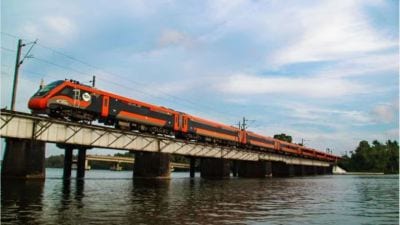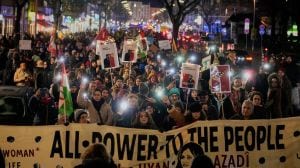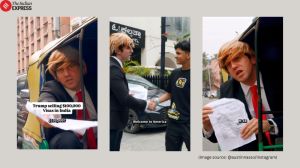Every strike has a sting
Last week8217;s unnecessary and rather perverse day-long disruption in large parts of the country continues to be the subject of bitter com...

Last week8217;s unnecessary and rather perverse day-long disruption in large parts of the country continues to be the subject of bitter comment. If many, if not most, people refuse to accept these ugly events as an aberration, the two Communist parties and their allies have only themselves to blame. For, instead of apologising for causing untold hardship to people and a loss of Rs 1,000 crore in GNP, the protagonists of the episode have 8216;warned8217; the UPA government 8212; which, ironically, they support from the outside 8211; that 8220;larger strikes of longer duration8221; would follow. Even so, what has surprised me is the number of those who have compared the Left-sponsored action on September 29 to the wave of irresponsible and undisciplined actions preceding the Emergency in the mid-8217;70s.
A connection between the current goings-on and the Emergency imposed by Indira Gandhi surely seems far-fetched, if only because that one essay in authoritarian rule destroyed the possibility of the Emergency being repeated. Indeed, if the 19-month nightmare proved anything, it established that India would be governed democratically or not at all. In any case, the heavily fragmented present political landscape is a far cry from what existed 30 years ago. Indira Gandhi had then dominated the scene like a colossus and her party had a two-thirds majority in both Houses of Parliament. It also ruled all the states, except Tamil Nadu and Gujarat, which were brought under President8217;s rule without any difficulty. Today, almost every party is ruling some state or other. Nor is the Supreme Court as 8216;helpful8217; as it was in 1975. Its judgment in the Bommai case speaks for itself.
Furthermore, the overall economic situation in 8217;74-8217;75 and today is as different as chalk is from cheese. At that point, the economy was in the doldrums, shortages were acute, inflation was high, and economic hardship was compounded by political strife. Today, despite the undoubted difficulties the poor face, the economy is growing at 8 per cent, inflation is under control and shortages are few.
Before and during the Emergency, I had lived in Bombay. Between the city and Thane, a distance of 32 kilometers, 1,200 industrial and business units were shut because of strikes and lockouts. This was more or less symbolic of what was going on in the rest of the country.
On top of all this had come the railway strike, hurriedly organised by the maverick George Fernandes. He was then even more unpredictable and reckless than during the years he was in power, and made no bones about his expectation that once the movement of coal stopped, every single factory would close down and the 8220;country would starve8221;. This strike was crushed with a degree of brutality that India had never seen before, nor witnessed since. To my surprise, in a generally anti-Indira ambience, there was widespread support for the government8217;s repressive action. The public mood changed against the then prime minister only after she refused to step down after the Allahabad High Court8217;s famous judgment.
There is, of course, no comparison between the railway strike of May 1974 and the recent irresponsible action of Left-controlled trade unions. And yet there is an uncanny semblance between the comments I have been hearing over the last few days and the applause by the middle class that had greeted the failure of Fernandes8217;s misadventure.
The Left may be gloating over the 8216;success8217; of its strike but it must know that its reasoning for suddenly inflicting on the country a day-long disruption is devoid of credibility. It may have differences with the UPA government over privatisation, an essential element in effective economic reform, but surely the appropriate forum for settling them is the coordination committee, not the country8217;s streets? Especially after the Left leaders, on Jyoti Basu8217;s wise advice, have withdrawn their hasty boycott of the committee. After all, the Manmohan Singh government, bowing to Left Front pressure, did drop its decision to sell a small fraction of the equity of the Bharat Heavy Electricals and other PSUs.
Similarly, there is an urgent need to do something about the shockingly inefficient running of the major airports in Delhi and Mumbai. If privatisation is unacceptable to it, the Left Front must come forward with alternative suggestions, along with precise proposals on how to raise the funds needed for the purpose. Not to come forward with any policy recommendation and persisting in saying no to whatever policy the UPA formulates after due deliberation, amounts to exercising power without responsibility which, in the words of a former British Prime Minister, is the 8220;privilege of the harlot8221;.
What renders the Left Front8217;s attitude utterly incomprehensible is that it is obstructing the very policies of the UPA government in New Delhi that its own chief minister in Kolkata, Buddhadeb Bhattacharya, is busy promoting in his state. And this brings me to a delicious quirk of irony. On the day of the disruption, what was advertised as a strike in banks and at airports only, was converted in West Bengal into a 8220;bandh8221; by the Left Front8217;s militant cadre. One of their victims was Bhattacharya; another, the chief minister8217;s wife going by car separately to her destination. Once recognised, both were rescued, of course. But ordinary people were not that lucky.
A serious damage, still unrecorded, that the events of September 29 did in Gurgaon 8212; in Congress-ruled state Haryana 8212; needs to be brought into the open. Besides forcibly extending the strike to industries, for which it was never meant, the strikers forced the BPOs to also shut down. This has dented the trust in them of those overseas companies that prefer to outsource their IT operations to Gurgaon and Bangalore, generating huge income and employment. Is this of no concern to the leaders of the CPM and CPI?
The demand by the BJP general secretary, Arun Jaitley 8212; that the CPI M and its allies should be fined for disrupting normal life, just as his party and the Shiv Sena had been for organising a bandh in Mumbai 8212; may have been motivated by partisan politics. But this does not detract from its legitimacy. In fact, India needs a law of torts so that every citizen can sue those who deprive him or her of the right to earn a living.
The writer is a well-known political commentator
- 01
- 02
- 03
- 04
- 05






























